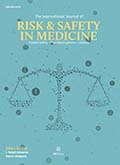Authors: Suryawati, Sri
Article Type:
Research Article
Abstract:
Inappropriate use of medicines is a prominent limitation in ensuring the accessability of the community to essential medicines. Worldwide more than 50% of all medicines are prescribed, dispensed, or sold inappropriately, while 50% of patients fail to take them correctly. Improving the use of medicines in developing countries is not a simple task. The complexity of medicine supply, imbalance between incentives and desinsentives, weaknesses in financing schemes, low salaries, market failure, inadequate information to the patients, etc., may contribute to the problem. Systematic approaches to promote rational use of medicines in low income countries was started in 1989, when clinical
…pharmacologists/pharmacologists of ten countries from Asia and African regions involved themselves in the establishment of the International Network for Rational Use of Drugs (INRUD). Each country-INRUD member consist of at least a clinical pharmacologist or pharmacologist, health manager, clinician, pharmacist and a behavioral scientist. The mission was to develop well-proven strategies to improve medicine use through comprehensive transdisciplinary approaches. Experiences have been discussed during the International Conference in Improving the Use of Medicine (ICIUM) in 1997, and recently in April 2004. Round-table discussions were conducted in Indonesia and Nepal in 2001, to redefine the role of clinical pharmacology in developing countries. The discussions involved representatives of stakeholders, e.g., clinicians, drug regulatory authority, professional afiliations, health managers, social scientists, health economics, community, and pharmaceutical industry. The major recommendation was to expand the scope and functions of clinical pharmacology beyond laboratory and clinical work to improving rational use of medicines on a country level. Without undermining the importance of laboratory and clinical activities, at present clinical pharmacology in developing countries should focus more on how medicines are selected and used in healthcare settings and in the community. To strengthen clinical pharmacology at the country level, networking and collaboration on a global scale is urgently needed. Such networking and collaboration is of high priority to facilitate the exchange and sharing of quality teaching materials, expertise, and experience in clinical pharmacology training, teaching, research, and services.
Show more
Keywords: Clinical pharmacology, developing countries, medicine use, rational use, training, teaching, research, services
Citation: International Journal of Risk and Safety in Medicine,
vol. 17, no. 1-2, pp. 57-64, 2005
Price: EUR 27.50





